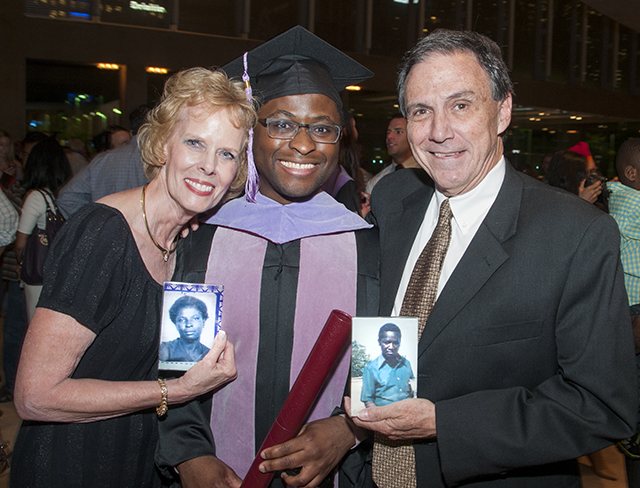Kachepa had grown accustomed to uncertainty. Two years before, at age 11, the Zambian native boarded an airplane bound for Texas. He'd been recruited by TTT: Partners in Education, a missionary group out of Whitesboro, to join its boys choir with the assurance he would receive money and an education. He made mental notes of the charmingly indulgent flight attendants and the diverse faces of the international passengers. Finally, he remembers thinking, I have a story to top any my brother could tell.
Keeping the Faith
Given Kachepa ('09) was a victim of labor trafficking, until he found a new future
with a UNT alum.
Photography by: Ahna Hubnik
June 26, 2020
Given Kachepa ('09) and six other boys sat together in a circle inside First Baptist Church Colleyville.
They awaited two possible outcomes. Either a good Samaritan would offer the teens
temporary shelter or, absent of any other options, Immigration and Naturalization
Service agents would be forced to place them in a holding cell.

Given Kachepa (top row, far right) with the TTT choir in Whitesboro.
But once in Texas, Kachepa wasn't allowed to speak to anyone from home. The promises proved bogus. When he or the other boys complained about their grueling work schedule -- sometimes performing as many as four concerts per day -- they were threatened with the withholding of food. Other times, they were warned they would be returned, alone and penniless, to Zambia.
Eventually, INS and the Labor Department caught wind of TTT's human trafficking operation, and the seven boys were picked up and brought to the church. Kachepa prayed for something good to happen.
And then, Sandy Shepherd walked in. A longtime member of First Baptist Colleyville, she had hosted a couple of boys from the TTT choir a few years earlier. Even then, she sensed something was off and reported her suspicions to the FBI. She knew the TTT ringleaders had told the boys she was "the devil."
"Sandy Shepherd is an angel," says Kachepa, a UNT biology graduate who now owns Inwood Dental Clinic in Dallas. "She took us in, made us feel at home, got us in contact with our families."
Shepherd, who studied education at UNT in the late 1960s, found host families for the other six boys, but Kachepa stayed with her. Her first step, aside from assuring him that everything would be OK, was to enroll him in eighth grade. During his first semester, they sometimes spent as many as six hours per day together on homework. But by spring, Kachepa insisted he catch up on his own. He scribbled three words on a whiteboard in his room: Focus. Determination. Perseverance.

Kachepa with Sandy Shepherd and her husband, Deetz, at Kachepa's dental school graduation.
The words guided him through high school, and then into college. He'd add phrases to the board, like "Do the hardest thing first." He twice took the SATs to secure his admission to UNT.
"Sometimes I'd be walking through campus, and I wouldn't believe I was here," Kachepa says. "I knew I had to work hard. This university believed in a kid who never would have had this opportunity in his own country."
Simultaneously, Kachepa worked tirelessly to bring attention to human trafficking in the U.S. Often accompanied by Shepherd, he's discussed his past at dozens of schools, churches and humanitarian organizations over the years, even receiving a Prudential Spirit of Community Award for his efforts in 2005.
"A lot of people don't understand modern-day slavery," Kachepa says. "It could be happening in your own backyard, and you don't even realize it."
After Kachepa graduated from UNT, he was accepted to the Baylor School of Dentistry. In a photo from his dental school graduation, Shepherd and her husband, Deetz, stand on either side of him. They hold portraits of his biological parents, who died when he was a child. The image -- now hanging in his clinic, where Shepherd supports him as office manager -- is a commingling of his past and present, and a reminder of the infinite possibility the future holds.
"I came to the U.S. with no money, no luggage -- nothing but hope," says Kachepa, who is working to build a dental clinic in his hometown of Kalingalinga. "Because of the Shepherds, my life has come full circle. The only way you repay somebody like that is by doing the best you can in life -- and the best you can to help others."